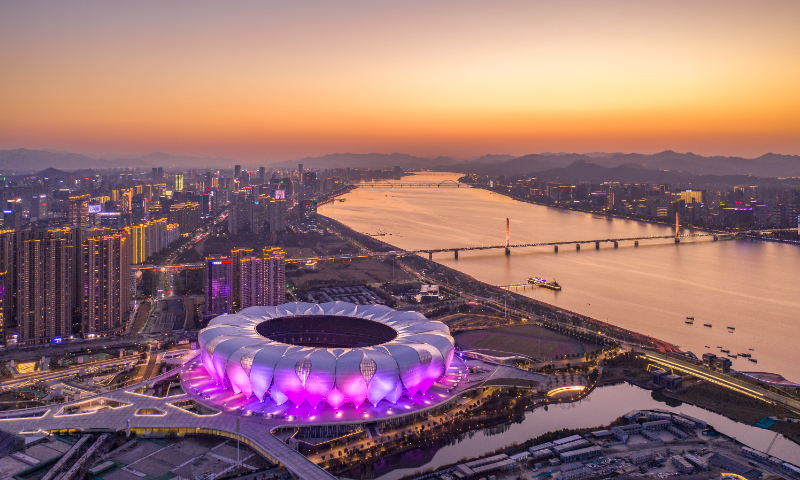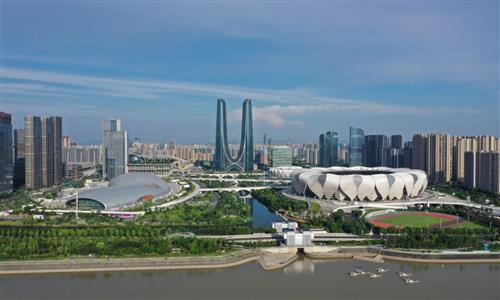Miraculous 'transformation' in 33 years: three Asian Games witness China's economic rise
Through lens of Asian Games in 1990, 2010 and 2023, China's rise is put on global eyes

An aerial view of Hangzhou Olympic Sports Centre Stadium in East China's Zhejiang Province Photo: VCG
During the past 33 years, from Beijing in 1990 to Guangzhou in 2010, and now to Hangzhou in 2023, the three host cities for the Asian Games in Chinese mainland serve as both geographical and historical landmarks. The cities not only record the stories of China's engagement with the Asian Games but also stand as a testament to China's great economic achievements.
During the 1990 Beijing Asian Games, China's economy embarked on a path of rapid development. However, it was still in the midst of the arduous phase of experimenting with reform and opening up, with annual GDP of merely 1.89 trillion yuan - or $395 billion at the exchange rate that time.
Back then, China's voice was considerably constrained on the international stage, with the country often labeled as "backward," "conservative," and "lacking vitality."
After 33 years, when a giant digital torchbearer joined Olympic gold medalist Wang Shun to light the main torch tower at the opening ceremony of the 19th Asian Games in Hangzhou, East China's Zhejiang Province, on Saturday, those labels might be the last words in the minds of global audience.
Economic miracles
The 1990 Beijing Asian Games marked China's inaugural hosting of a large-scale international sports event, for which the country nearly "emptied its pockets of every penny" to sponsor. According to media reports, the preparations for the Asian Games at that time required a budget of 2.5 billion yuan, with a notable 600-million-yuan shortfall.
A grand nationwide fundraising campaign unfolded to help with preparations, with over 100 million people contributing funds and materials to the Asian Games organizing committee. In the end, the total raised reached an impressive 700 million yuan, according to media reports.

Lottery tickets are on sale in Beijing to raise money for 1990 Asian Games facilities in August, 1989 Photo: VCG
"The country was poor at that time and we all chipped in," Jiang Fajun, an associate professor at a college in Harbin, Northeast China's Heilongjiang Province, told the Global Times on Monday.
At that time, Jiang had just started his career, and now he's approaching retirement. Reflecting on the nationwide donations for hosting the Beijing Asian Games back then and witnessing the grand opening ceremony of the Hangzhou Asian Games now, he was deeply moved, saying that "the lighting of the cauldron was a spectacular sight, and it's exciting to see the country become richer and stronger each day."
The Yangtze River Delta region, where Zhejiang is located, is one of the most vibrant, open, and innovation-driven areas in China's economic landscape.
In 2022, Zhejiang recorded a GDP of 7.77 trillion yuan ($1.06 trillion), ranking fourth among China's mainland provinces. As a main force driving China's foreign trade, the province's high-tech exports increased by 26.8 percent and its mechanical and electrical products exports rose by 11.1 percent, official data showed.
The design and manufacturing of the main torch tower in the Asian Games stadium were entirely sourced from local Zhejiang enterprises for the event. In recent years, Zhejiang has been rapidly forging a modern industrial ecosystem with advanced manufacturing as its cornerstone, marked by a steady surge in corporate research and development investments.
While China as a whole has risen to become the world's second largest economy, with an annual GDP exceeding 121.02 trillion yuan in 2022, an increase of about 64 times compared with 1990.
Building confidence
In 1990, globalization was still in its nascent stage, and the entire Asian economy, especially East Asia, accounted for only about 20 percent of the global economy, experts said.
Two decades later when China's second Asian Games was held in Guangzhou, South China's Guangdong Province, China has surpassed Japan and became the world's second largest economy, with its manufacturing sector the world's largest, Tian Yun, a veteran economist based in Beijing, told the Global Times.
Nowadays, China's manufacturing scale has far exceeded that of the US and Japan combined, Tian said.
Moreover, China is now the largest trading partner of more than 120 countries and regions. As the most important engine of world economic growth, China's contribution to global growth has remained at around 30 percent annually for decades.
Also, the internationalization of the Chinese yuan has steadily gathered pace, with more and more countries using yuan to settle foreign trade and investment. China-proposed Belt and Road Initiative has also attracted growing number of countries and regions to join hands and seek win-win development, Chinese experts said.
The benefits of hosting large-scale sports events like the Asian Games are not simply driving the growth of certain industries. More importantly, it serves as a distinctive platform to showcase China's achievements in various social and economic sectors, Tian said.
By showcasing China's advanced infrastructure development, cutting-edge technological advancement and high-quality service industry on a global scale, it conveys to people in Asia and around the world the long-term potential and confidence in China's economic future, Tian noted.
It is meaningless for a few Western politicians and media outlets to once again attempt to trumpet the "China collapse" theory. It is not the first time for them trying to dampen investor confidence in China and their attempts will fail again, the experts said.
The development of China's economy has evolved beyond quantitative growth; it now emphasizes qualitative enhancement too. Simultaneously, China has been committed to opening up its market and share growth opportunities with the world, Tian said.
Over the past 33 years, China's economy achieved remarkable progress, and in the future, the nation will continue to assume the role of a responsible major country, actively driving the recovery and development of both Asian and global economies, Chinese experts said.



